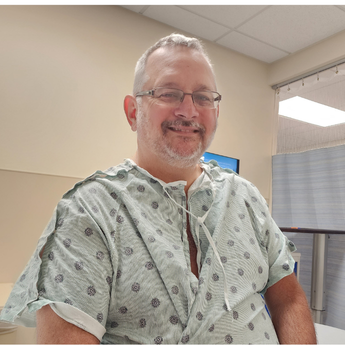By Adriana Ermter
In our monthly column, senior writer and editor Adriana Ermter shares her personal experiences with breast cancer.
Are you going to freeze your eggs?”
I was asked this question multiple times when I was first diagnosed with breast cancer. Yes, I still had my monthly period and no, I wasn’t in menopause. But I was 47 years old, so the query felt out of place. When I’d remind the doctors of my age they’d sigh and say, “Oh, right. You look younger. So do you think it’s something you’ll want to do?” Umm, no. A hard no. Divorced, single and edging towards 50, starting a family by myself was not something I wanted. Plus, I’d tried to have kids when I was married, and my lack of success had been heartbreaking.
But lots of women are in their childbearing years when they are diagnosed and do want to have a family post breast cancer. According to the Canadian Cancer Society, 0.5 per cent of women under the age of 30 are diagnosed with breast cancer each year. Another 16.3 per cent are like me and diagnosed between the ages of 30 and 49 years. So, understanding what oncofertility is and knowing what fertility options are available can be incredibly important.
In a nutshell, oncofertility is the process of saving or protecting your eggs so that you have the option to have biological children in the future. Cancer treatments, such as radiation and chemotherapy can damage the organs in your body’s reproductive system, which can adversely affect your ability to get pregnant or to stay pregnant post breast cancer treatment. The Canadian Cancer Society notes that chemotherapy can be the dominant factor causing fertility problems, pending the type of chemotherapy you receive, the dose and the length of your treatment and the number of drugs used. While it’s possible, based on age, that your fertility may return once your treatment has completed, it’s still best to know and weigh your options. And so, the best insight I can share is this: If you want to have kids, make sure to ask your oncology doctors to connect you with a fertility specialist immediately.
The fertility specialist will assess your desire to have a family and your health to provide you with the information you need. To help prepare you for these conversations, here is some insight into the most common oncofertility options available, complete with their pros and cons, so that you can have a say in and have more control over your own body and future.
Freezing Your Eggs
You may hear doctors refer to this procedure as oocyte cryopreservation, but essentially it means freezing your eggs. It’s also one of the most popular oncofertility options for women diagnosed with breast cancer. Especially, if you’re not in a committed relationship and know that you want to have kids in the future, as it can provide you with the opportunity to preserve your eggs before you undergo treatment. The process involves stimulating the ovaries to produce multiple eggs, which are then retrieved, frozen, and stored for future use.
The pros: Freezing your eggs gives you the opportunity to maintain your fertility potential, which can provide you with more flexibility with your family planning post-treatment.
The cons: The process can be mentally taxing, as it requires time and emotional investment. Physically, the hormonal stimulation may cause temporary discomfort and potential side effects such as bloating, sore breasts, headaches, mood swings, insomnia, and even hot or cold flashes.
Freezing Your Embryos
This is also known as embryo cryopreservation and involves fertilizing eggs with sperm and freezing the resulting embryos. It’s a great option if you’re married or in a committed relationship with your life partner with whom you know you want to start a family with, in the future.
The pros: This procedure has higher success rates than freezing your eggs. Plus, you don’t feel alone when you do it, as your partner is participating in every step of the journey with you.
The cons: You need a male partner or donor sperm, and the procedure might be time-sensitive, depending on your cancer treatment’s timeline.
Ovarian Tissue Freezing
This is when a small piece of ovarian tissue is removed from your body, frozen and then, at a later time, transplanted back into your body. The technique is particularly beneficial for prepubescent girls and women who cannot undergo hormonal stimulation.
The pros: Emotionally, this is an easier option to experience because it offers you the potential for natural conception post-treatment.
The cons: The procedure is still considered experimental, and the success rates are not as well-established as other methods. Additionally, there is a risk of re-implanting cancer cells, and the surgical procedure itself carries inherent risks, such as bleeding and infection.
GnRH
Gonadotropin-releasing hormone (GnRH) can indirectly stimulate your body’s estrogen and progesterone production, which are the key sex hormones you need to ovulate and to get pregnant. The GnRH is a chemical drug that can be administered during your cancer treatment to suppress ovarian function temporarily to protect your ovaries from the harmful effects of chemotherapy.
The pros: The option is non-invasive and can be easily integrated into your cancer treatment.
The cons: It may not be suitable for your type of breast cancer. You may also experience menopausal symptoms, such as hot flashes, night sweats, joint pain, vaginal dryness, headaches and more, which may impact your quality of life during treatment.
In Vitro Maturation (IVM)
This is when your immature eggs are collected and matured in a laboratory. The process eliminates the need for hormonal stimulation, so may or may not be suitable for you, depending on your stage and grade of breast cancer.
The pros: IVM provides an alternative for women who cannot undergo standard fertility preservation methods.
The cons: Its success rates may be lower than traditional methods, and not all of your eggs are guaranteed to mature during the process.
Adriana Ermter is a multi award-winning writer and editor. Her work can be read in Sotheby’s Insight, Living Luxe and IN Magazine, as well as online at 29Secrets.com, RethinkBreastCancer.ca, Popsugar.com and AmongMen.com. The former Beauty Director for FASHION and Editor-in-Chief for Salon and Childview magazines lives in Toronto with her two very spoiled rescue cats, Murphy and Olive. You can follow Adriana on Instagram @AdrianaErmter.







